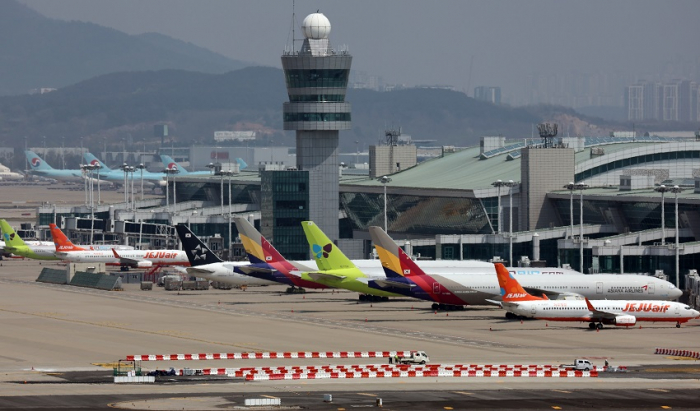
Incheon International Airport (Courtesy of Yonhap) South Korea’s airlines are suffering from surging oil prices, a weaker won and rising interest rates as the global border reopening has yet to translate into a full-fledged recovery in demand for international flights.The US Federal Reserve on Wednesday took the most aggressive tightening step since 1994 by raising the target federal fund rate by 75 basis points (bps). That prompted expectations that the Bank of Korea may increase interest rates by 50 bps, larger than its usual adjustment of 25 bps.Higher interest rates are bad for airlines since they lease many aircraft. The country’s top carrier Korean Air Lines Co. has to spend 45 billion won ($34.8 million) more for borrowing costs a year when an average interest rate rises 1 percentage point, while its smaller rival Asiana Airlines Inc. needs to pay 32.8 billion won.A weaker won also boosts local airlines’ costs as they usually make payments for aircraft leases and fuel purchases in dollars. Korean Air is estimated to see a foreign exchange valuation loss of some 41 billion won when the South Korean currency weakens by 10 won against the greenback. Asiana is also likely to suffer such a loss of 28.4 billion won.Global oil prices kept rising, ramping up fuel costs that account for about 20-30% of airlines' fixed costs. The global jet fuel price surged 128.1% to $176.56 per barrel on June 10 from a year earlier, according to the International Air Transport Association.BUDGET AIRLINES ARE HIT HARDERThe triple whammy hit harder the country’s low-cost carriers, which have been in the red for more than two years.“The fixed costs about doubled,” said a source at one of the budget airlines. “We have no choice but to hope a recovery in market conditions as soon as possible with increasing the supply of flights and more lifts of COVID-19 regulations.”Demand for passenger flights are gradually reviving, but it is far from the levels before the pandemic. The number of international flight passengers at Incheon International Airport, the country’s hub airport, totaled 617,533 in the first 16 days of this month, about fivefold from 123,275 a year earlier. But that was less than 20% of 3.1 million in the same period of 2019 before COVID-19 broke out.A local body for the private sector’s pilot urged the government to extend financial support for LCCs.The government has been providing special support packages to industries that COVID-19 hit including airlines to maintain payrolls.“About 40% of LCC employees are still on paid leave as the government’s remaining COVID-19 restrictions on entrants prevent travel demand from increasing and Japan, a key destination, has not allowed entry without a visa,” said the Airline Pilots Association of Korea. “The payment of the employment support fund, which is scheduled to end this month, should be extended to year-end.”By Jeong Min Nampeux@hankyung.comJongwoo Cheon edited this article.
Most Read